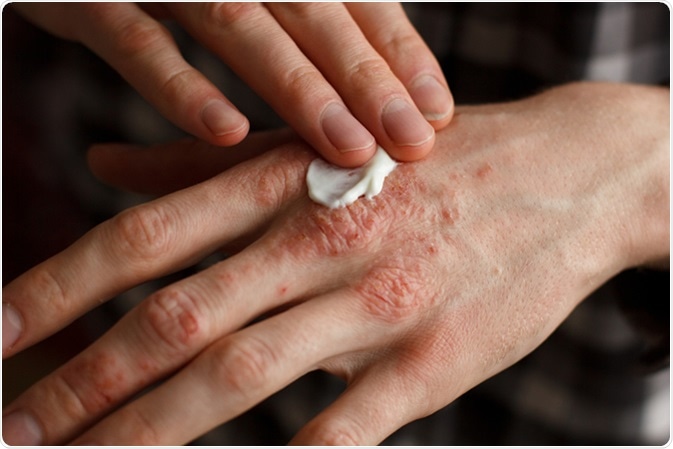Eczema, also known as atopic dermatitis, is a chronic, non-infectious, and inflammatory skin disease, which causes skin reddening and itching. It is usually very common in children; however, it can affect individuals at any age.
Symptoms
Eczema has a tendency to flare up periodically and generally become worse at night. The main symptoms of eczema include itching, redness, and dry skin. Eczema may occasionally result in blister formation, which may leak fluids when scratched. As the disease persists for a long period, the skin may eventually become thick, cracked, and swollen.
The intensity of these skin symptoms varies from individual to individual. Depending upon the age, the site of eczema differs. For example, the cheeks, arm, and legs are more common sites of eczema in infants, whereas adolescents and adults often have eczema at the back of neck, and knee, as well as inside the elbow joints, palms, and feet; however, the condition rarely affects the faces of these older patients.
Although there is practically no cure for eczema, the symptoms can be subsided to a greater extent by regularly moisturizing the skin, applying medicated creams or ointments, and avoiding harsh soaps and irritants. Besides these recommendations, some dietary management and lifestyle measures have also been recommended to control eczema, particularly cases that are triggered by food and inhalant allergens.

Image Credit: Ternavskaia Olga Alibec / Shutterstock
Causes of eczema
The exact cause of eczema is still not known. In eczema patients, it has been noticeable that the corneal layer of the skin becomes damaged due to an inflammatory response, which may be induced by different allergens or as a result of the hyper-responsiveness of the immune system. This can cause insufficient protection to the inner layer of the skin.
Eczema may be develop as a result of a genetic mutation that inhibits the production of filaggrin, which is a protein that is necessary for the formation of skin’s outer layer. As a result, the skin tends to lose a lot of moisture and becomes less protective against irritants, allergens, and infectious agents.
A hyperactive immune system is a common feature in eczema patients. Their immune system reacts to various internal and external substances and produces antibodies as part of their defense mechanism. This phenomenon triggers inflammatory reactions, which subsequently result in red, itchy, and painful skin.
Eczema triggers
Eczema triggers can be anything that either develops eczema on the skin or intensifies already existing eczema. Eczema triggers may vary from person to person and can also change over time for a particular person.
Dry skin
Since dry skin is one of the most common features of eczema, anything that makes the skin dry can be a trigger. It may range from extremely cold or hot environments with low humidity to the frequent use of harsh soaps without applying moisturizer.
Stress
Emotional stresses such as anger, sorrow, embarrassment, anxiety, and other strong emotions, are considered significant eczema triggers. Studies have also shown a significant association between depression and eczema flare-ups.
What Causes Eczema to Flare Up - DERMCLASS
Irritants
Some daily life commodities that are used directly on the skin or in the house, such as body soap, shampoo, laundry soap, dish cleaning detergent, and disinfectants, can potentially trigger an eczema flare-up. Some common examples of irritants include:
- Soaps
- Shampoos
- Domestic cleaners
- Certain fabrics, such as wool and synthetic cloth
- Some dietary items like cow's milk, soy products, nuts, and eggs.
Environmental factors
Eczema patients are highly sensitive about their surrounding environment. Tobacco smoking and house dust mites increase sensitivity reactions and trigger eczema. Additionally, pollen, molds, and pet fur are other common environmental eczema triggering factors.
Even seasonal factors influence eczema. Dry and cold weather, as well as the humid season, can also trigger eczema.
Sweating
Excessive sweating due to heavy exercise or wearing too many clothes can make the skin dry and trigger eczema. In fact, the sweating of some individuals can cause a hypersensitivity reaction to arise, which subsequently triggers the release of histamine. Experts recommend taking a shower after completion of physical exercise for individuals who have eczema to avoid sweat induce flare.
Allergens
Allergic reactions are often known to trigger skin irritation and eczema. Common food allergens that trigger eczema include milk, eggs, fish, wheat, soy, and peanuts. In addition, seasonal pollens, dust mites, and animal dander are among the common environmental allergens that can prompt an eczema bout.
Skin infection
Both bacterial and viral skin infections can be potential eczema triggers. Staphylococcus aureus is a common bacterium that induces infection in eczema patients. Among viruses, the herpes virus, molluscum contagiosum, and vaccinia are linked to eczema flare-ups and can induce severe skin infections in eczema patients.
Hormones
Hormonal fluctuations in the body are sometimes known to trigger episodes of eczema attacks, especially in women. Hormonal fluctuations are common during the menstruation cycle, pregnancy, and during both the postpartum and perimenopausal phases.
References
Further Reading
Last Updated: Apr 26, 2021